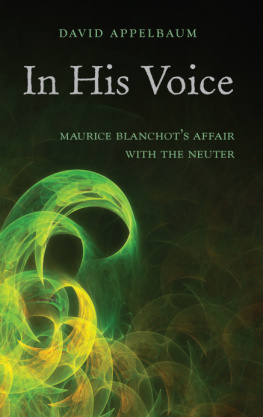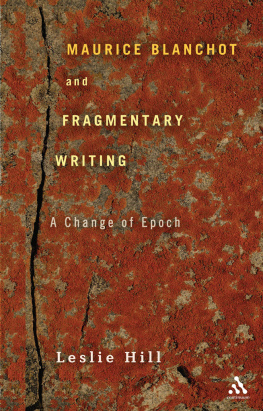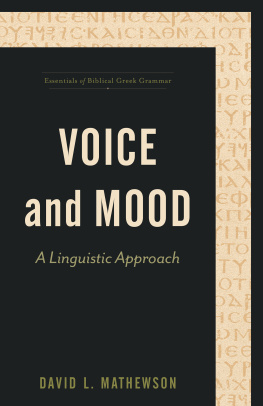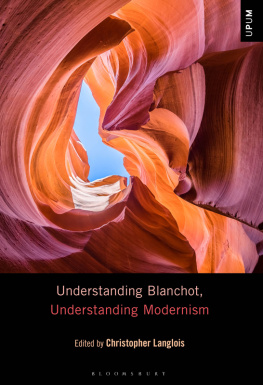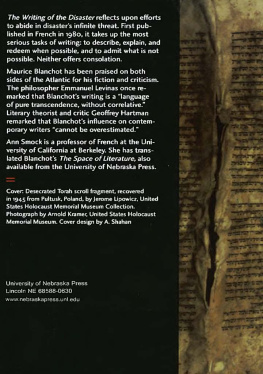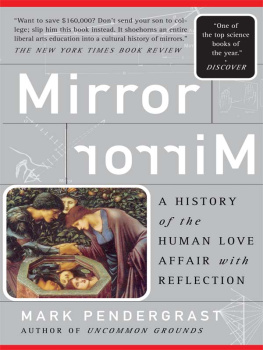In His Voice
In His Voice
M AURICE B LANCHOTS
A FFAIR WITH THE N EUTER
DAVID APPELBAUM
Published by
STATE UNIVERSITY OF NEW YORK PRESS
Albany
2016 State University of New York
All rights reserved
Printed in the United States of America
No part of this book may be used or reproduced in any manner whatsoever without written permission. No part of this book may be stored in a retrieval system or transmitted in any form or by any means including electronic, electrostatic, magnetic tape, mechanical, photocopying, recording, or otherwise without the prior permission in writing of the publisher.
For information, contact
State University of New York Press
www.sunypress.edu
Production, Laurie D. Searl
Marketing, Michael Campochiaro
Library of Congress Cataloging-in-Publication Data
Appelbaum, David.
In his voice : Maurice Blanchots affair with the neuter / David Appelbaum.
pages cm
Includes bibliographical references and index.
ISBN 978-1-4384-5979-0 (hardcover : alk. paper)
ISBN 978-1-4384-5981-3 (e-book)
1. Whole and parts (Philosophy) 2. Perspective (Philosophy) 3. Nothing (Philosophy) 4. Blanchot, Maurice. I. Title.
| BD396.A67 2016. |
| 843'.912dc23 | 2015012445 |
10 9 8 7 6 5 4 3 2 1
For Kate Stroud Hamilton
Ah this blind voice, and these moments of held breath when all listen wildly, and the voice that begins to fumble again, without knowing what its looking for and again the tiny silence and the listening again, for what, no one knows, a sign of life perhaps, that must be it, a sign of life escaping someone, and bound to be denied if it came, thats it surely, if only all that could stop, thered be peace, no, too good to be believed, the listening would go on, for the voice to begin again, for a sign of life, for some one to betray himself, or for something else, anything, what else can there be but signs of life
Beckett, The Unnamable
Contents
Preface
In His Voice: Maurice Blanchots Affair with the Neuter has a twofold aim. The first is to deepen a post-phenomenological investigation of authorial voice, the voice that appears on the scene of writing. The second is to utilize as frame and resource Maurice Blanchots discoveries vis--vis voice. They represent crossings or chiasma between his thinking and my own. His prolonged fascination reveals, in its principal insight, that the writers voice in a literary work lacks a direct presentation and has one given in response to a second voicethe others voice or the otherwise than voice. Only with this responsiveness does the singularity of authorial voice make its appearance.
Blanchot conceives of the alterity as a murmurous null point of vocalization. It is the sirens song, with allusion to Homer, or the cacophonous resonance of unadorned being, the il y a of Levinas, a motile chaos that precedes subjectivity, consciousness, and the properly human. Normally suppressed in the name of linguistical efficacy and worldly reality, its irrepressibility is the quilting point of literature since Romanticism. Writers such as Hlderlin, Rilke, Kafka, Mallarm, Ren Char, and Beckett lead Blanchot to speak of the authorial voice that embodies otherness as the neuter . The neuter voice, avoiding the repressive tendencies both of everyday language and philosophical discourse, reveals a menace to our appropriation of being and the order of things. Confronting it as reader, one falls under an exigency quite different from that of worldly comportment.
In accordance with current views, voice itself also has a twofold nature. It declares, yielding statements about the world, and it performs, presenting enactments of what it has power to do. To secure its signature, authorial voice is faced with a paradoxical task in relation to the alterity that speaks through and constitutes it. Since no statement of what lies beyond meaning is possible, it relies on performance to do the trick. Thus, the logic of how to present a performance of inscription is never far from my concern. By the same token, naked criticism, analysis, and explication of Blanchots texts are less useful and more peripheral facets of the current study. Instead, it would debut an exemplary performance of the scene of writing, who, where, and what takes placewith Maurice Blanchot as designated writer.
Abbreviations
Maurice Blanchot
| AO | Awaiting Oblivion. Tr. John Gregg (Lincoln, University of Nebraska Press, 1997) |
| F | Friendship . Tr. Elizabeth Rottenberg (Stanford, Stanford University Press, 1997) |
| FP | Faux Pas . Tr. Charlotte Mandell (Stanford: Stanford University Press, 2001) |
| I | The Instant of My Death (with Demeure: Fiction and Testimony by Jacques Derrida). Tr. Elizabeth Rottenberg (Stanford, Stanford University Press, 2000) |
| IC | The Infinite Conversation . Tr. Susan Hanson (Minneapolis, University of Minnesota Press, 1993) |
| LM | The Last Man . Tr. Lydia Davis (New York: Columbia University Press, 1987) |
| SL | The Space of Literature. Tr. Ann Smock (Lincoln, University of Nebraska Press, 1982) |
The Station Hill Blanchot Reader . Ed. George Quasha, Tr. Paul Auster, Lydia Davis, and Robert Lamberton (Barrytown, NY, Station Hill Press, 1998): This anthology includes translations of Thomas the Obscure (TO), Death Sentence (DS), The Madness of the Day (MD), When the Time Comes (WTC), and The One Who Was Standing Apart from Me (TOW).
| SNB | The Step Not Beyond. Tr. Lycette Nelson (Albany, SUNY Press, 1982) |
| UC | The Unavowable Community . Tr. Pierre Joris (Barrytown, NY, Station Hill Press, 1988) |
| WD | The Writing of the Disaster . Tr. Ann Smock (Lincoln, University of Nebraska Press, 1986) |
| WF | The Work of Fire . Tr. Charlotte Mandell (Stanford, Stanford University Press, 1995) |
Jacques Derrida
| A | Aporias . Tr. Thomas Dutoit (Stanford: Stanford University Press, 1993) |
| AL | Acts of Literature . Ed. Derek Attridge (New York: Routledge, 2002) |
| D | Dissemination . Tr. Barbara Johnson (Chicago: University of Chicago Press, 1981) |
| DE | Demeure: Fiction and Testimony (with The Instant of My Death , by Maurice Blanchot). Tr. Elizabeth Rottenberg (Stanford: Stanford University Press, 2000) |
| EO | The Ear of the Other: Otobiography, Transference, Translation . Tr. Peggy Kamuf (Lincoln: University of Nebraska Press, 1988) |
| G | Glas . Tr. John P. Leavey Jr. and Richard Rand (Lincoln: University of Nebraska Press, 1986) |
| GD | The Gift of Death . Tr. David Wills (Chicago: University of Chicago Press, 1995) |
| MB | Memoirs of the Blind . Tr. Pascale-Anne Brault and Michael Naas (Chicago: University of Chicago Press, 1993) |
| P | Parages . Tr. Tom Conley, James Hulbert, John P. Leavey, and Avital Ronell (Stanford: Stanford University Press, 2011) |

